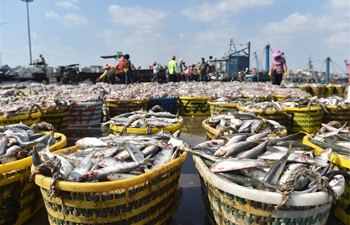DUBAI, Oct. 3 (Xinhua) -- The employment index in the United Arab Emirates (UAE) remained below 50 for the second consecutive month, despite an increase in the NBD Purchasing Managers' Index (PMI), said bank Emirates NBD Wednesday.
The PMI, which measures activities in the non-oil private sector, stood at a bullish level of 55.3 in September, the third month in a row with a reading at the 55-handle, said NBD in a statement.
Although output and new work rose sharply in September, supported by growth in export orders, "employment remained below the neutral 50-level for the second consecutive month," said the statement.
The index of an expanding economy usually stands above 50, while a reading below 50 indicates a contracting economy or economic sub-sector.
"The majority of firms reported no change in employment in September but nearly 2 percent of firms reported a decline in jobs. Staff costs (a proxy for wages) were also largely unchanged last month," said Khatija Haque, head of the Middle East and North Africa Research department at Emirates NBD.
"Year to date, the PMI averaged 55.7, similar to the same period last year," he added.
On Jan. 1, 2018, the UAE and its major trade partner Saudi Arabia introduced a 5-percent VAT on most products and services, which lifted purchasing and administration costs in the Gulf state, affecting margins and the investment climate.
Earlier in the week, the International Monetary Fund (IMF) said it is optimistic about the UAE for 2019 as oil prices rebounded to a four-year high above 80 U.S. dollars per barrel (159 liters) last week.
The UAE government announced on Sunday the biggest federal budget ever of 16.4 billion dollars for 2019, representing a 17.3-percent increase from the current year.
With oil production and government spending set to rise, overall growth is projected to strengthen to 2.9 percent this year and 3.7 percent next year, said the IMF.

















